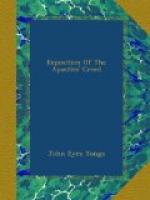Actual sin consists in breaking any law of God made known to us by Scripture, conscience, or reason. It assumes many forms. There are sins of thought, of word, of deed; sins of commission, or doing what God forbids; of omission, or leaving undone what God commands; sins to which we are tempted by the world, the flesh, or the devil; sins directly against God; sins that wrong our neighbours, and that ruin ourselves; sins of pride, covetousness, lust, gluttony, anger, envy, sloth. In many things we sin, and “If we say that we have no sin, we deceive ourselves, and the truth is not in us."[199]
Man’s sinfulness is set forth in Scripture by a great variety of figures. The word rendered “sin” means the missing of a mark or aim. Sin is sometimes described as ignorance, sometimes as defeat, sometimes as disobedience. The definition of the Shorter Catechism is clear and comprehensive. “Sin is any want of conformity unto, or transgression of, the law of God."[200] The taint of original sin, extending to man’s whole nature, inclines him to act in opposition to the law of God, and every concession to his corrupt desire, in thought, word, or deed, is actual sin. Because of it he is not subject to the law of God, neither, indeed, can be.
Sin is always spoken of in Scripture as followed by punishment or by pardon. There is no middle way. Salvation for man must therefore involve deliverance from condemnation.
The word which expresses man’s liability to punishment is “guilt,” and only a religion which makes known how he may be set free from guilt will suit his necessities. We cannot set ourselves free from condemnation. “Man,” says the Confession of Faith, “by his fall into a state of sin, hath wholly lost all ability of will to any spiritual good accompanying salvation; so, as a natural man, being altogether averse from that good, and dead in sin, is not able, by his own strength, to convert himself, or prepare himself thereunto."[201] Forgiveness of sin must come from God. There is nothing in nature or in human experience to warrant hope of pardon. Nature never forgives a trespass against her law. The opportunity that is lost does not return. The mistake by which a life is marred cannot be undone. The constitution shattered by intemperance cannot be restored, the birthright bartered for a mess of pottage is gone for ever, and no bitter tears or supplications have power to bring it back. Whether we repent of it or not, every sin we commit leaves its dark mark behind, and in this life at least the stain can never be effaced; and yet we believe in the forgiveness of sin through the grace of God.
The forgiveness of sin is a free gift purchased by “the Lamb of God that taketh away the sin of the world,” who by His Cross and Passion obtained for men this unspeakable benefit, and commanded that repentance and remission of sins should be preached in His name among all nations.[202]




